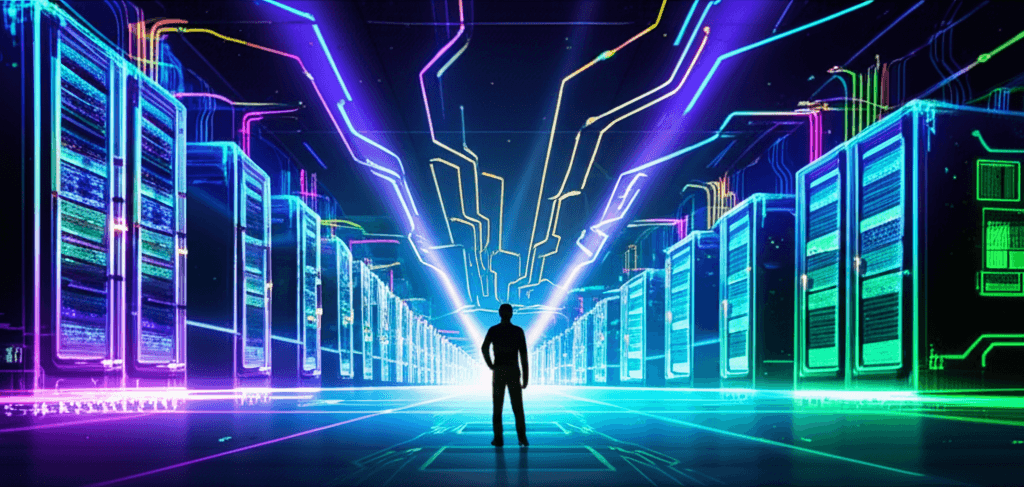Meta Pours Billions into Superhuman AI, Building Gigawatt Data Centers
Meta's unprecedented multi-billion dollar AI bet: massive data centers, custom chips, and top talent chase superintelligence.
July 15, 2025

Meta is embarking on a monumental spending spree, pledging to invest hundreds of billions of dollars into the development of artificial superintelligence, a move underscored by the construction of massive, power-intensive data centers.[1][2] This ambitious strategy positions the social media giant in a high-stakes race against other technology titans to achieve what many see as the ultimate frontier in artificial intelligence: systems that surpass human cognitive abilities. The company's CEO, Mark Zuckerberg, has personally taken the helm of this initiative, signaling a strategic pivot that will reshape the company's focus and financial commitments for years to come.[3][4] The effort involves not only building out unprecedented computational infrastructure but also aggressively recruiting the brightest minds in the AI field, creating an elite, talent-dense team dedicated to this singular goal.[5][6]
The backbone of Meta's superintelligence ambitions lies in its enormous investment in physical infrastructure. The company plans to construct several "superclusters," which are vast data centers designed specifically for the immense computational demands of training advanced AI models.[5] One of the first of these, dubbed "Prometheus," is slated to come online in 2026 and will be a one-gigawatt facility.[3][5] Following Prometheus will be an even larger cluster named "Hyperion," which is expected to scale up to five gigawatts over several years.[3][5] To put this into perspective, just one of these data centers is said to cover a significant portion of the footprint of Manhattan.[5] The initial capital expenditure for these AI data centers is projected to be between $64 billion and $72 billion for the current year alone.[1][3] These facilities will be equipped with hundreds of thousands of the most advanced graphics processing units (GPUs) from suppliers like Nvidia, with plans to have the equivalent of nearly 600,000 Nvidia H100 GPUs by the end of 2024.[7][8]
To complement its reliance on external hardware suppliers, Meta is also making significant strides in developing its own custom silicon.[8][9] The company has begun testing its first in-house chip designed for training AI systems, a move aimed at reducing its dependence on companies like Nvidia and lowering long-term operational costs.[9][10] By designing its own AI accelerators, Meta can create hardware specifically tailored to its unique workloads, potentially leading to greater efficiency and performance.[10] This vertical integration strategy mirrors similar moves by competitors like Google and Amazon and is seen as a critical step in managing the astronomical expenses associated with large-scale AI development.[9][11] The company's first custom training chip is expected to be integrated into its systems by 2026, initially supporting recommendation algorithms before expanding to more complex generative AI applications.[10]
The pursuit of superintelligence is not just a hardware challenge; it requires a world-class team of researchers and engineers. Recognizing this, Zuckerberg has taken a direct and personal role in recruiting top AI talent, reportedly engaging in private dinners and discussions with leading experts.[4] This has resulted in a series of high-profile hires from rival companies and research labs, including Apple's former head of AI models and the CEO of Scale AI, who will now head Meta's superintelligence team.[3][5] This aggressive talent acquisition is part of an effort to create what Zuckerberg calls the "most elite and talent-dense team in the industry."[5][6] The formation of this new "superintelligence group" comes amid some internal dissatisfaction with the progress of Meta's existing AI models, prompting a renewed and more focused effort led directly by the CEO.[4]
The implications of Meta's multi-billion dollar bet on superintelligence are vast and extend across the technology landscape. The sheer scale of the investment underscores the escalating AI arms race, where computational power is seen as a key strategic advantage. While some, including Meta's own chief AI scientist Yann LeCun, express a more measured view, suggesting that superintelligent AI will serve as a powerful tool under human control rather than a replacement for human intellect, the immense resources being poured into its creation signal a belief in its transformative potential.[12][13] This long-term vision, however, is not without its challenges. The enormous financial outlay, the technical hurdles of building both hardware and software at an unprecedented scale, and the intense competition for a limited pool of top talent all represent significant risks. Nevertheless, Meta's leadership appears resolute, viewing this massive investment as a foundational necessity to drive its core products, unlock future innovation, and secure a leading position in the next era of computing.[1][14]